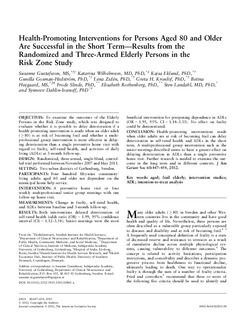Health-promoting interventions for persons aged 80 and older are successful in the short term-results from the randomized and three-armed Elderly Persons in the Risk Zone study
Gustafsson, S.; Wilhelmson, K.; Eklund, K.; Gosman-Hedström, G.; Zidén, L.; Kronlöf, G.H.; Dahlin-Ivanoff, S.
Journal article

Åpne
Permanent lenke
http://hdl.handle.net/11250/2477978Utgivelsesdato
2012Metadata
Vis full innførselSamlinger
Originalversjon
Gustafsson, S., Wilhelmson, K., Eklund, K., Gosman-Hedström, G., Zidén, L., Kronlöf, G.H., . . . Dahlin-Ivanoff, S. (2012) Health-promoting interventions for persons aged 80 and older are successful in the short term--results from the randomized and three-armed Elderly Persons in the Risk Zone study. Journal of the American Geriatrics Society, 60(3), 447. 10.1111/j.1532-5415.2011.03861.xSammendrag
Objectives: To examine the outcomes of the Elderly Persons in the Risk Zone study, which was designed to evaluate whether it is possible to delay deterioration if a health-promoting intervention is made when an older adult (=80) is at risk of becoming frail and whether a multiprofessional group intervention is more effective in delaying deterioration than a single preventive home visit with regard to frailty, self-rated health, and activities of daily living (ADLs) at 3-month follow-up. Design: Randomized, three-armed, single-blind, controlled trial performed between November 2007 and May 2011. Setting: Two urban districts of Gothenburg, Sweden. Participants: Four hundred fifty-nine community-living adults aged 80 and older not dependent on the municipal home help service. Intervention: A preventive home visit or four weekly multiprofessional senior group meetings with one follow-up home visit. Measurements: Change in frailty, self-rated health, and ADLs between baseline and 3-month follow-up. Results: Both interventions delayed deterioration of self-rated health (odds ratio (OR) = 1.99, 95% confidence interval (CI) = 1.12–3.54). Senior meetings were the most beneficial intervention for postponing dependence in ADLs (OR = 1.95, 95% CI = 1.14–3.33). No effect on frailty could be demonstrated. Conclusion: Health-promoting interventions made when older adults are at risk of becoming frail can delay deterioration in self-rated health and ADLs in the short term. A multiprofessional group intervention such as the senior meetings described seems to have a greater effect on delaying deterioration in ADLs than a single preventive home visit. Further research is needed to examine the outcome in the long term and in different contexts.